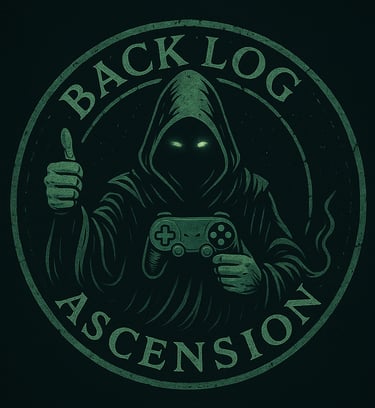Mass Effect
A Sci-Fi Epic That Soars, Stumbles, and Stuns

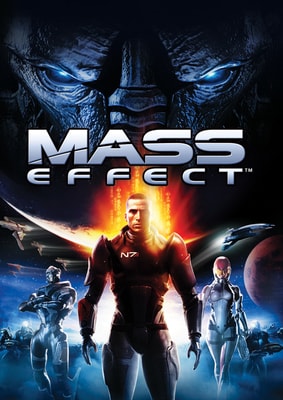

91


Mass Effect doesn’t open like a Marvel trailer. No quips, no fireworks, no one telling you destiny is waiting in the lobby. It begins with a hum, a ship cutting through silence, and a galaxy that looks like it was built long before you ever showed up. The Legendary Edition remaster doesn’t rewrite that introduction. It doesn’t need to. It just buffs the steel, sharpens the shadows, and reminds you that BioWare once knew how to create universes that felt lived in before you pressed a single button. This is the game that made me realize western RPGs could feel dangerous without being grimdark or nihilistic. You play Commander Shepard, and the details of who that is, your decisions, your voice, your posture in every conversation, matter less than the fact that the universe itself never bends to you. It’s not a power fantasy. It’s a power test.
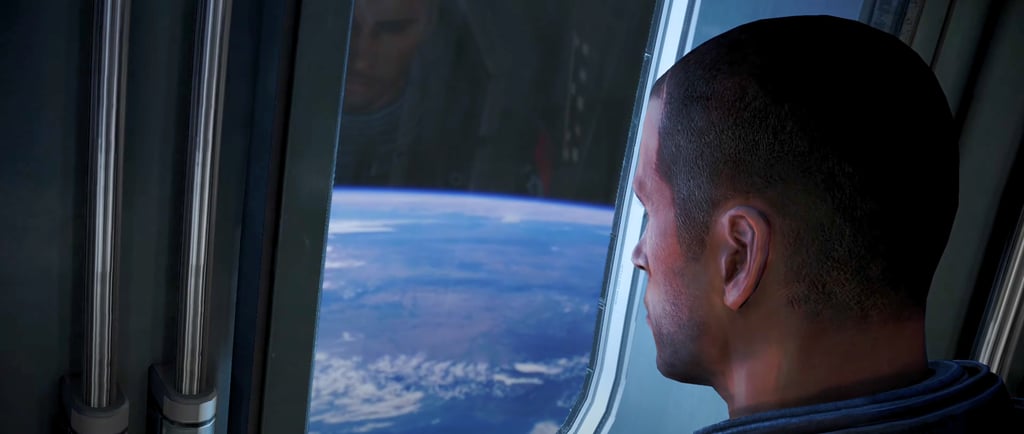

Building a Galaxy from Scraps of Paper and Whiskey Stains
Strip the story down to bones and it looks ordinary: bad guy goes rogue, ancient threat looms, politics clog the gears while the timer ticks down. But the way Mass Effect stitches it together feels anything but ordinary. BioWare didn’t just abandon Star Wars when LucasArts pulled the plug on KOTOR, they cannibalized its DNA, rewired it, and built a galaxy where every culture, every law, every minor race with three codex entries feels like it was dragged through centuries of bureaucracy and war. The sterile planets, yes, they’re still sterile even in the remaster, don’t break the spell. They reinforce it. The emptiness is part of the design, the suggestion that in a galaxy this big, of course you’ll stumble on worlds where nothing waits for you but rocks, thin air, and the sound of your Mako rattling like a shopping cart. What sells it most is the crew. This isn’t a roster of walking upgrade trees; it’s a family you didn’t sign up for but end up carrying. Garrus, the cop who never stopped believing he’s the last good man in a corrupt system. Wrex, the Krogan mercenary who embodies both a dying culture and a gallows-humor drinking buddy. Tali, all nerves and idealism under a sealed suit. And Liara, who I romanced: quiet brilliance wrapped in stuttering vulnerability, someone you feel protective of until you realize she’s the one holding you together. The relationships aren’t side dishes, they’re the main course. By the time the galaxy throws its hardest questions at you, the weight isn’t just on your shoulders. It’s in the way your squadmates look at you after you make the call.
The Combat Works Until It Doesn’t
Now, let’s cut the politeness: Mass Effect’s combat is serviceable. Not great, not terrible, just functional enough to get you from one conversation to the next without you resenting the whole process. The third-person shooting feels floaty, the cover system is unreliable, and enemies often soak bullets like crash-test dummies. But abilities help. Watching biotics slam enemies into walls never gets old, and squad commands give fights some tactical flavor even if the AI occasionally forgets it has a pulse. The Mako deserves its own paragraph. It’s infuriating, absurd, and somehow addictive. The thing drives like a moon buggy strapped to a trampoline. You’ll curse its refusal to obey physics while grinning the whole time. Scaling a cliff and seeing the horizon spill open with a base in the distance hits a nerve modern waypoint design forgot existed. The Mako is a pain, but it’s your pain, and that makes it memorable. The real villain is the inventory system. It’s horrific, a bureaucratic swamp of nearly identical weapons and upgrades that turns equipping Shepard into a punishment. Even Legendary Edition’s tweaks don’t save it. You’ll spend more time dismantling trash than celebrating finds. For a game that nails so much of the big picture, the menus feel like a cruel joke. the loop isn’t “fight, loot, upgrade.” It’s “talk, decide, survive.” Combat is just punctuation. The story is the sentence.
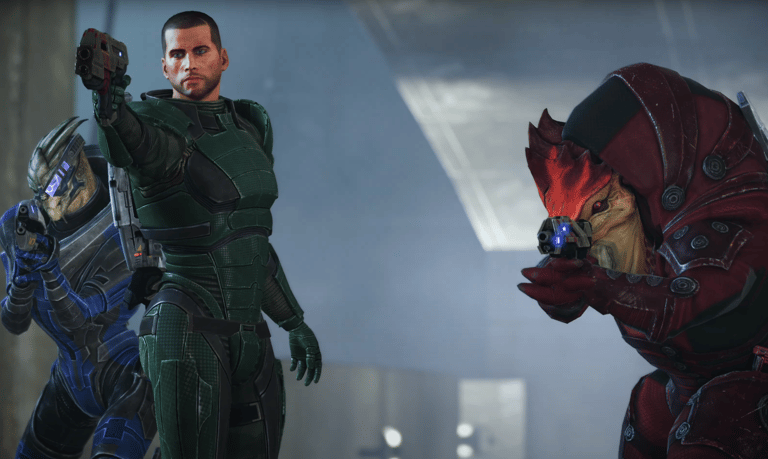

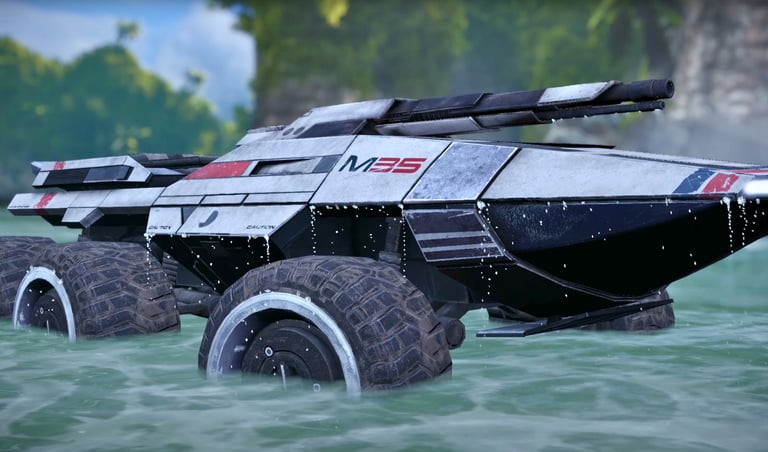

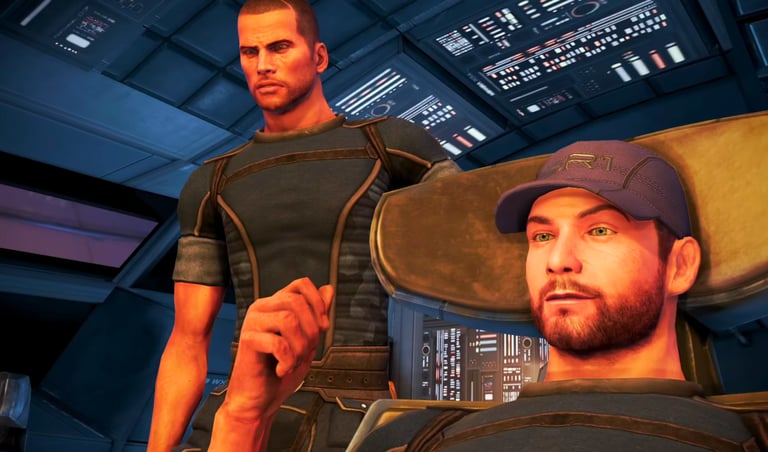

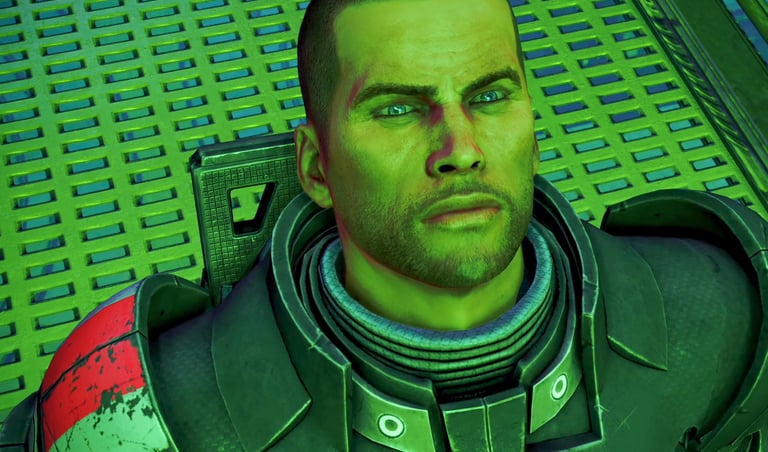

Steel and Neon, Flesh and Choirs
The Legendary Edition’s visuals are honest about what they are: a remaster, not a rebirth. Characters look better, no more wax dolls sweating under cheap lighting, but they still move with a stiffness that reminds you these animations were born in the mid-2000s. The Normandy looks gorgeous now, its angles catching light like a ship designed to be revered, not just boarded. Some worlds remain lifeless, but at least they shine in a way that makes the emptiness feel deliberate. Textures are sharp, armor carries scratches, faces finally reflect the mood of the moment. It’s not modern cinematic realism, but it’s enough to bridge memory with expectation. The soundscape is where Mass Effect has always flexed. The score is pure synth cathedral: pulsing, mournful, a mix of Vangelis and midnight radio. The main theme alone is a time machine, and even if you’ve never touched the game before, it will make you nostalgic for futures you’ve never lived. Voice acting seals it. Mark Meer’s Shepard is dry, almost monotone, but it fits the role of someone who can’t afford indulgence. The supporting cast does the heavy lifting, grounding every exchange with personality. Even minor side characters sound like they’ve got mortgages and regrets, not just dialogue trees.
Innovation by Conviction, Not Gimmick
Mass Effect didn’t invent morality systems, branching dialogue, or squad-based banter. But it welded them into a machine that still feels unique. The Paragon/Renegade split is blunt, sure, but the illusion of shaping a galaxy gives the game its identity. It doesn’t sell choice as novelty, it sells it as responsibility. And responsibility, especially in games, is rarer than new mechanics. What makes Mass Effect stand out isn’t that it tried something no one else had. It’s that it committed. It let decisions sting. It let conversations breathe. It let silence sit heavy on the table before the next mission. Games now chase frictionless dopamine loops; Mass Effect asked for patience and rewarded it with gravity. It’s also the last time BioWare felt reckless. Before the committees, before the clean edges and safe narratives, they built something messy and audacious. They left grit under the nails. Even when it stumbled, like that cursed inventory, you could feel the intent burning through. That intent, more than polish, is why the game still feels alive.
Closing the Airlock
So who is this for today? Not the tourist gamer who wants instant gratification. Not someone allergic to text boxes or conversation wheels. Mass Effect is for people willing to sit in a captain’s chair, listen to their crew argue, and treat dialogue as action. It’s for anyone who values a world that feels older than you, bigger than you, and indifferent to whether you survive it. The strengths are obvious: a story that punches above its structure, world-building that makes most modern RPGs look like improv, characters who crawl under your skin and stay there, and a soundtrack that baptizes even the smallest moments. The weaknesses are just as clear: clunky combat, a tragicomic inventory system, and exploration that sometimes mistakes barren for profound. But here’s the thing, none of that derails it. Because Mass Effect isn’t a collection of mechanics. It’s an atmosphere, a conviction, a dare. It asks you to take it seriously without begging for it. And when the final decision lands, it hits harder precisely because the game never promised you comfort. The Legendary Edition didn’t turn Mass Effect into a modern blockbuster. It didn’t need to. It reminded us what it feels like when a game swings big, risks clunk, and trusts the player to handle consequence. That’s not nostalgia talking, it’s recognition. Recognition that games this committed don’t come around often, and when they do, they leave scars.
